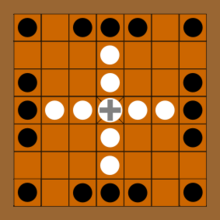- Fidchell
-
Fidchell irisch, auch Dinkel fidhcheall, fidceall, fitchneal oder fithchill), walisisch gwyddbwyll ['gwiðbuiɬ], Bedeutung in beiden Sprachen „Holz-Verstand“ (gwydd bzw. fid = „Holz“, pwyll bzw. cíall = „Verstand“), war ein keltisches Brettspiel. dessen genaue Regeln unbekannt sind, eine Ähnlichkeit zum Schachspiel wird angenommen. Es diente sehr oft zur Bewältigung kriegerischer Konflikte in Form einer Ersatzhandlung. [1]
Nach einer Beschreibung hatten die Spielsteine unten einen kleinen Zapfen, der in entsprechende Löcher im Brett gesteckt werden konnte, ähnlich unserem heutigen Reiseschachspiel.[2]
Ein vermutlich ganz ähnliches Spiel ist das nordische Hnefatafl oder Königszabel.
Mythologie
Fidchell wird in irischen Sagen (z.B. im Táin Bó Cuailnge, „Der Rinderaub von Cooley“) häufig von den mythischen Königen und Helden gespielt. König Conchobar mac Nessa von Ulster war durch geis (Tabu) verpflichtet, ein Drittel des Tages beim fidchell zuzubringen.[1]
In der walisischen Satire Breuddwyd Rhonabwy („Rhonabwys Traum“). spielt gwyddbwyll eine wichtige Rolle im Streit zwischen König Artus und Owein fab Urien. Auch in Breuddwyd Macsen („Macsens Traum“) wird es mit einerm silbernen Brett und goldenen Figuren gespielt. In Peredur fab Efrawg („Peredur, Efrawgs Sohn“) sind die Figuren in einem menschenleeren Saal lebendig geworden und spielen gegeneinander (siehe Lebendschach).[3]
Literatur
- Helmut Birkhan: Kelten. Versuch einer Gesamtdarstellung ihrer Kultur. Verlag der Österreichischen Akademie der Wissenschaften, Wien 1997, ISBN 3-7001-2609-3.
- Sylvia Botheroyd: Irland, Mythologie in der Landschaft. Ein Reise- und Lesebuch. Häusser u. a., Darmstadt 1997, ISBN 3-89552-034-9, S. 127.
- Bernhard Maier: Lexikon der keltischen Religion und Kultur. Kröner, Stuttgart 1994, ISBN 3-520-46601-5 (Kröners Taschenausgabe 466).
Anmerkungen
Kategorien:- Brettspiel
- Historisches Spiel
- Kultur (Irland)
- Kultur (Wales)
Wikimedia Foundation.

